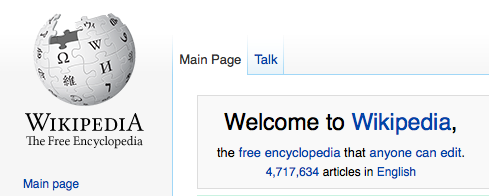Who makes Linux? Why are they giving it away? Can these people be trusted?
Longtime Linux users might laugh at this question, but think about it from another perspective. In the age of Facebook, when "free" often turns out to mean "ad-supported and will track your every move", anyone who isn't familiar with open source licenses is going to be skeptical of anything that's "free".
"If you're not paying, you're the product", the adage goes.
So it needs to be said: Linux, and other open source software, isn't free in the sense that Facebook or Gmail are – that is, it's not an ad-supported endeavour offered by hugely profitable corporations (though many large companies do contribute to open source projects). Instead Linux is a collaborative project that the whole world can participate in, should they decide to do so. Yes: even you.
So who makes Linux? We all do. Let's talk about what this means, using an example that's easier for non-programers to understand: Wikipedia.
How Wikipedia Works
Wikipedia is one of the most popular websites on earth, but hardly anyone is paid to add things to it. Instead, people passionate about particular topics click the "Edit" button at the top of every article. Anyone can do this, without adding an account.
This is, more or less, how the most complete compilation of human knowledge ever assembled gets built: by people who decide to contribute. Linux works the same way.
Of course, Wikipedia is more complicated than that. There's a dedicated core group of editors, who look closely at new changes and decide whether they should stick. There are Wikipedia bots that make corrections. Admins occasionally lock down pages, if their subject matter is temporarily controversial.
Over time a system has developed, but the fact remains that it's almost entirely volunteers who make Wikipedia what it is. Linux, as we know it, is much the same way: a wide-ranging group of volunteers contribute code to the thousands of programs that make up modern Linux distros.
Of course, Wikipedia has its flaws. The articles about individual Pokemon generally see more edits than those about entire African nations, and fights about trivialities can dominate the "talk" section for months. (The crowd can be really smart, but it also sometimes has strange priorities). The Wikipedia process – like all open source projects - is messy, in the way any democratic community is. It's a free-flowing, ongoing project that somehow adds up to one of the single most useful resources on the entire Internet.
And you know what? Most Linux distros work the same way.
Open Source: Something We All Work On
Most Internet users are familiar with Firefox, one of the web's most popular browsers. It is a prominent example of open source software – that is, software that anyone who wants to is free to edit for their own purposes.
Similar to Wikipedia, Firefox is "edited" by a team of volunteers. Thousands of people work together to help build this browser, which is in turn used by millions of people free of charge.
What's this has to do with Linux? Well, most Linux distros include Firefox – they're free to do so, because Firefox is open source. Every Linux distro is a compilation of thousands of different projects, all of which like Firefox have their own teams. But Linux distros themselves also have teams of volunteers that help put everything together.
Every one of these projects publishes their source code publicly, meaning anyone who wants to make a suggestion can look at the code and do so. The conversations between developers is typically also public, meaning you can read up on their decision-making process if you want to. If you want to get more involved, you can contact the developers behind a project and offer to help – in time you might become a core developer yourself.
But even if you don't code, there are ways you can contribute. Artists could design icons or wallpapers, for example. Anyone willing to use a beta version can provide valuable feedback. Writers can help put together documentation.
This is, at its best, what open source is: a project created for and by its most passionate users.
More Eyeballs On The Code
Some people might not like this approach, preferring everything be controlled by a single company with a unified vision in mind. And that's not necessarily an incorrect argument, but it's worth pointing out the open source model offers certain advantages.
Let's talk about Wikipedia again. There are mistakes on Wikipedia, sure, but there are also millions of people looking it over every day. The more people who look at a page, the more people who might noticed – and fix – any given mistake.
The same can be said about open source software. When Microsoft builds a new version of Windows, only Microsoft employees get to look at the code. When an open source project works on a new version, they do so in public – the entire world can look at the code, if they want. And the more people who look at it, the more likely it is any given problems will be pointed out.
Conversations about such potential problems are happening constantly. Sometimes they can get nasty, at which point schisms happen. In fact, anyone can take an existing open source project and make their own version of it – a process called forking.
I could go on. Needless to say, there are pros and cons to either approach – but traditionally Linux and other open source projects have been quick to react to potential problems because of how many people look over the code.
Who Makes Linux? You Do. Jump In!
Linux isn't just an operating system: it's a community. It can also be a pretty fun hobby, if you want to get into it. You might need to learn what a bunch of new words mean, but once you start diving in you'll really be able to make your computer your own.
Whether you're a Windows XP refugee, looking for a way to keep a faithful computer running securely, or just someone who's naturally curious, I highly recommend you check out our list of the best Linux distros and jump right in. You can trust the people who make Linux, and even join them if you want to.
And now: collaboration! How was my explanation of Linux, and open source? What are the best ways for people to get involved? What mistakes in this article would you like to correct? Feel free to talk about all this and more in the comments.






